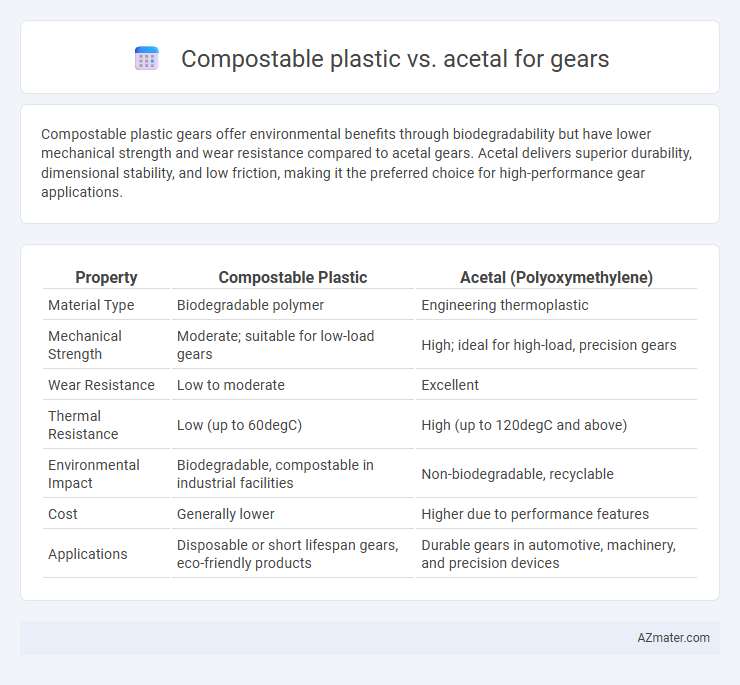Compostable plastic gears offer environmental benefits through biodegradability but have lower mechanical strength and wear resistance compared to acetal gears. Acetal delivers superior durability, dimensional stability, and low friction, making it the preferred choice for high-performance gear applications.
Table of Comparison
| Property | Compostable Plastic | Acetal (Polyoxymethylene) |
|---|---|---|
| Material Type | Biodegradable polymer | Engineering thermoplastic |
| Mechanical Strength | Moderate; suitable for low-load gears | High; ideal for high-load, precision gears |
| Wear Resistance | Low to moderate | Excellent |
| Thermal Resistance | Low (up to 60degC) | High (up to 120degC and above) |
| Environmental Impact | Biodegradable, compostable in industrial facilities | Non-biodegradable, recyclable |
| Cost | Generally lower | Higher due to performance features |
| Applications | Disposable or short lifespan gears, eco-friendly products | Durable gears in automotive, machinery, and precision devices |
Introduction to Eco-Friendly Gear Materials
Compostable plastics offer a sustainable alternative for gears by breaking down naturally and reducing environmental impact compared to traditional polymers. Acetal, a durable engineering thermoplastic, provides high strength and low friction but is non-biodegradable, making it less eco-friendly. Choosing compostable plastic gears supports circular economy goals, while acetal gears prioritize performance and longevity in mechanical applications.
Understanding Compostable Plastics
Compostable plastics used for gears are typically derived from renewable biomass sources such as cornstarch or sugarcane, breaking down into non-toxic components under industrial composting conditions within 90 to 180 days. These materials offer environmental benefits by reducing reliance on petroleum-based plastics and minimizing landfill waste, yet they often lack the mechanical strength and thermal stability found in acetal (polyoxymethylene) gears, which provide high wear resistance, low friction, and dimensional stability critical for precise engineering applications. Understanding the degradation rates, load-bearing capacity, and environmental impact of compostable plastics compared to acetal is essential for selecting appropriate materials in gear manufacturing.
What is Acetal?
Acetal, also known as polyoxymethylene (POM), is a high-performance engineering thermoplastic renowned for its excellent mechanical properties, low friction, and high dimensional stability, making it ideal for precision gears. Unlike compostable plastics, which prioritize environmental decomposition, acetal offers superior wear resistance, rigidity, and resistance to moisture and chemicals, ensuring long-lasting gear performance in demanding applications. Its ability to maintain strength and stability under continuous load makes acetal a preferred material for gears in automotive, industrial, and consumer products.
Mechanical Properties: Strength and Durability
Compostable plastics offer limited mechanical strength and lower durability compared to Acetal, making them less suitable for high-stress gear applications. Acetal exhibits superior tensile strength, excellent wear resistance, and high fatigue endurance, which ensures reliable performance in precision gear mechanisms. The enhanced dimensional stability and low friction coefficient of Acetal contribute to its widespread use in gears requiring long-term durability and mechanical robustness.
Wear Resistance and Longevity
Acetal gears offer superior wear resistance and longevity due to their high mechanical strength and low friction properties, making them ideal for high-load and continuous operation applications. Compostable plastics typically lack the durability required for gear applications, exhibiting faster degradation and reduced wear resistance under mechanical stress. Selecting acetal ensures sustained performance and longer service life in gear mechanisms compared to compostable plastic alternatives.
Environmental Impact and Degradability
Compostable plastics offer significant environmental benefits due to their ability to break down into non-toxic components within 90 to 180 days under industrial composting conditions, reducing landfill accumulation and microplastic pollution. Acetal, a petroleum-based thermoplastic, exhibits excellent mechanical strength and durability for gears but is non-biodegradable and contributes to long-term environmental persistence and potential microplastic contamination. Choosing compostable plastic gears enhances sustainability by minimizing ecological footprint through improved biodegradability and reduced reliance on fossil fuels.
Cost Analysis and Market Availability
Compostable plastic gears offer an eco-friendly alternative with lower material costs but have limited durability and higher long-term replacement expenses compared to acetal gears. Acetal, a high-performance engineering thermoplastic, commands a higher initial price due to superior mechanical properties and widespread industrial acceptance, driving extensive market availability. The cost analysis favors compostable plastics for short-term, low-load applications, while acetal remains cost-effective for demanding, high-precision gear systems with reliable supply chains.
Manufacturing and Processing Differences
Compostable plastic gears typically require lower processing temperatures and shorter cycle times compared to acetal, which demands higher melting points and precise mold temperature control due to its crystalline nature. Compostable plastics often exhibit different shrinkage rates and may need specialized drying processes to prevent moisture-related defects, whereas acetal benefits from consistent dimensional stability and ease of machining. Manufacturing gears with acetal generally allows for higher mechanical performance and wear resistance, while compostable plastics prioritize environmental sustainability but might require adjusted molding parameters to maintain gear integrity.
Application Suitability: Industrial vs. Consumer Uses
Compostable plastics offer limited durability and thermal resistance, making them suitable primarily for low-stress consumer gear applications with short lifespans and environmentally focused disposal. Acetal (polyoxymethylene) excels in industrial gear applications due to its high mechanical strength, excellent wear resistance, and dimensional stability under heavy loads and continuous operation. Selecting acetal over compostable plastic ensures superior performance and longevity in demanding environments such as manufacturing machinery and automotive components.
Future Trends in Gear Material Innovation
Compostable plastics are emerging as sustainable alternatives in gear manufacturing, offering biodegradability and reduced environmental impact compared to traditional materials. Acetal resins remain popular for gears due to their high strength, low friction, and excellent dimensional stability, but ongoing research aims to enhance their recyclability and bio-based sourcing. Future trends in gear material innovation prioritize eco-friendly composites and hybrid polymers that balance performance with sustainability, addressing the growing demand for circular economy solutions in mechanical components.

Infographic: Compostable plastic vs Acetal for Gears
 azmater.com
azmater.com